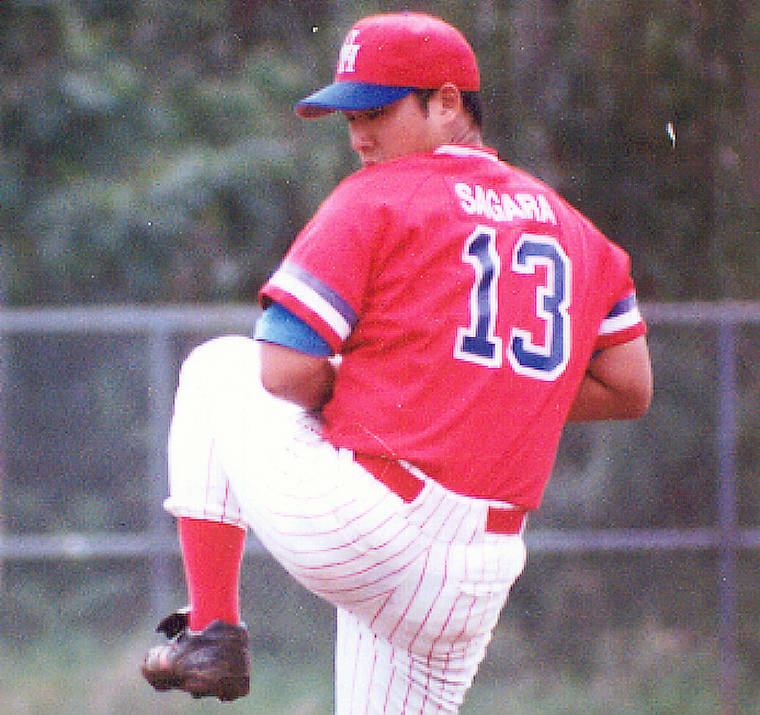Brendan Sagara was ready to play the long game, relying on patience and productivity to reach his dream destination.
The former UH-Hilo pitcher was named as the Texas Ranges co-pitching coach last week, enduring a 20-year journey to reach the big leagues. This past season Sagara, 47, served as the Triple A pitching coach for the Rangers, but perhaps more importantly he was also a special assistant in player development.
He’s back on Oahu, where he spends his offseason with wife Michelle, and will report in January to either Texas or Arizona for spring training.
He’s not hitting the beaches or relaxing at home. Sagara is still working, developing pitching plans, holding Zoom meetings, and conducting phone interviews with his pitchers to get acquainted.
Sagara ran the Rangers taxi squad across the street from Globe Life Stadium, home of the World Series.
There’s no state income tax in Texas, so maybe Sagara might look into buying a condo and a fish for a pet.
“In the past, I’d go back and forth,” he said. “The last four years I would come home once a month for a week. It’s the first time I’m continuously with a team. I think she’ll be making more trips now.”
Most MLB teams have pitching coaches who played in the majors, like the Dodgers’ Mark Prior. It’s a built-in advantage for former MLB players to land roles in the front office or on a staff shortly after retiring.
That’s not the case for someone like Sagara, who spent 12 years in independent pro ball, including a stint in Hawaii as the Na Koa Ikaika Maui pitching coach.
So how does someone without the MLB resume land a job on the Rangers staff?
If it were a decade ago, it probably wouldn’t happen. But MLB is in the Moneyball 2.0 era with tech-driven data.
“We’re in the era of game information age of baseball,” Sagara said. “MLB teams and front offices are hiring people with diverse backgrounds.
“I knew I had to play the long game, value every experience and it would take longer to build my track record.”
It also helps to be able to network. Talking to Sagara is like listening to an MLB analyst with an engaging personality, the opposite of the Bill Belichick monochromatic monologue.
“We’re at the forefront of analytics that occurred in the industry in the last few years,” Sagara said. “They’re valuing every role differently. I was in scouting and a pitching coordinator (for the Chicago Cubs) and ran rehabs. I was a pitching coordinator for a long time. I put things together, from analytical data and had the right frame of mind. This is one of the opportunities that led to the job with the Rangers.”
He and co-pitching coach Doug Mathis, who pitched three years with the Rangers, have a lot of work to do. Texas ranked 23rd in team ERA at 5.02. The World Series champion Dodgers were first with a 3.11 ERA in 2020.
The Rangers are a mid-market team and can’t buy their way to success like the New York Yankees, who signed Gerrit Cole for $324 million or the Dodgers, who inked Mookie Betts for $365 million. They’ll have to stick with the draft-and-develop model.
They struck gold with third baseman Isiah Kiner-Falefa, who recently picked up a Gold Glove. He was drafted in the fourth round in 2013 out of Mid Pacific, played around the infield, including catcher, and earned the full-time job in 2020.
Sagara will have a diamond in the rough to work with in right-hander Cole Winn, a No. 1 draft pick in 2018.
“He’s a mega-talent. I had him most of the time on the taxi squad,” Sagara said. “He throws in the upper 90s, throws four pitches for strikes, good makeup, good kid.
“We’ve got a lot of young talent. It’s about embracing the best versions of themselves.”
The Rangers’ last World Series’ appearance was in 2011 when they lost in seven games to the St. Louis Cardinals. It’ll be a long game for Texas to get back to the World Series. And who better than someone like Sagara, who knows something about patience, to steer the Rangers in the right direction.

